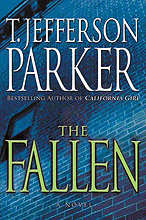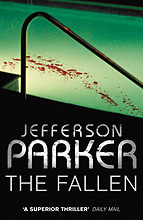 |
 |
 |
|
|
THE FALLEN (2006) When Garrett Asplundh's body is found under a San Diego bridge, Homicide Detective Robbie Brownlaw and his partner, McKenzie Cortez, are called on to the case. After the tragic death of his child and the dissolution of his marriage, Garrett—regarded as an honest, straight-arrow officer—left the SDPD to become an ethics investigator, looking into the activities of his former colleagues. At first his death, which takes place on the eve of a reconciliation with his ex, looks like suicide, but the clues Brownlaw and Cortez find just don't add up. With pressure mounting from the police and the city's politicians, Brownlaw fights to find the truth, all the while trying to hold on to his own crumbling marriage. Was Garrett's death an "execution" or a crime of passion, a personal vendetta or the final step in an elaborate cover-up? Read an excerpt. Read reviews. Listen to the audio clip. Vladimir Nobokov had it. David Hockney has it. And so did Vasily Kandinsky, Franz Liszt and Jimi Hendrix. Rimbaud wanted it because Baudelaire was rumored to have it. In my new novel, THE FALLEN, the detective has it. Synesthesia. What the heck is synesthesia? It's a rare mixing of the senses (syn—"union" and aesthesis—"sensation.") What it means is your senses become transposed. You might be able to see musical notes as colors, or hear numbers, or even taste words. Two in every 10,000 people have synesthesia, and researchers say a lot of them don't even know what the condition is called. In THE FALLEN, detective Robbie Brownlaw suffers a terrible injury. Afterwards he begins to see people's emotions as colored shapes that spill from their mouths as they speak. He doesn't imagine these colored shapes. He sees them. They're usually two-by-inches in size, four to eight in number, they linger for a second or two, and he can move them with a finger or pencil before they vanish. At first he's got no idea what's going on. Then he starts to realize. Red squares are deception. Yellow triangles are fear. Lavender ovals are sympathy. Green trapezoids come from envy. So, Robbie has a primitive lie detector inside him. But he has to find out if it's dependable. He has to trust it. Jimi Hendrix trusted his synesthesia. He liked to describe chords and harmonies as colors. He called the chord E7#9—often referred to by guitarists as the Hendrix chord—as "the purple chord," and used it to help form the verse of his song, Purple Haze. Beethoven called B minor "the black key." Nabokov wrote of his "fine case of colored hearing. Perhaps 'hearing' is not quite accurate, since the color sensation seems to be produced by the very act of my orally forming a given letter." I became interested in the brain and how it functions when my mother and my wife were both diagnosed with brain tumors just a few years apart. As I watched my two very loved ones go through the biological degeneration and the trauma of medical treatment for these cancers I saw the powers of their beautiful minds become confused, diffused, weakened, and finally, lost. In the years since I've kept up an interest in our mysterious, complex brains. I learned about a little-understood portion of the brain called the amygdala—which governs our abilities to experience and store emotions—to write a novel called BLACK WATER. I've visited the Brain Imaging Center at the University of California, Irvine, to see some of the latest treatments and experiments involving the human brain. It's endlessly fascinating. One day, at a book signing for BLACK WATER, a woman asked me if I knew about synesthesia and I confessed that I didn't. Well, a visit to the web and a few phone calls put me in touch with the volumes being written and talked about today involving this compelling condition. So, enjoy the novel and the odd, lovely, sometimes surprising ways that we can experience the realm of the senses. Morrow US hardcover Feb 2006 ISBN13 9780060562380 ISBN 0060562382 HarperCollins UK hardcover May 2006 ISBN 000720258X HarperCollins trade paperback May 2006 ISBN 0007202547 HarperLargePrint trade paperback April 2006 ISBN 0061121290 Brilliance Audio MP3-CD (abridged) Feb 2006 ISBN 9781593356958 Brilliance Audio CD (abridged) Feb 2006 ISBN 9781596008663 Brilliance Audio CD (unabridged) Feb 2006 ISBN 9781590869796 Brilliance Audio cassette (unabridged) Feb 2006 ISBN 9781590869765 Brilliance Audio (download) Feb 2006 ISBN 9781597109437 Winner of The Best Mystery of 2006 Award from the Southern California Booksellers Association; and a New York Times Bestseller! Excellent... The suspense is palpable ... With his trademark psychological acuity and empathy, Parker creates a world of fully realized characters coping with obsession and loss. The winner of two Edgars for best novel, Parker could well earn a third with this compelling effort. —Publishers Weekly (starred review) [Parker] writes with intelligence, style and sensitivity, and he belongs with people like Connelly and Pelecanos in the first rank of American crime novelists. —Washington Post His dialogue crackles and pops in an intricate and well-paced tale set in a city where shadowy characters lurk beneath sunny skies. —Booklist (starred review) Deftly plotted, gracefully written and, as usual with this savvy veteran, it's the lead character you pay your money for. Robbie is another in Parker's growing gallery of wonderfully sympathetic heroes. —Kirkus Reviews (starred review) When all is said and written, T. Jefferson Parker could well be the best crime writer working out of Southern California. —Chicago Tribune The Fallen is that rare novel that sends a reader scurrying off to find all the other books in the author's catalog. —The Sunday Oregonian Since 2001, two of his novels have won the prestigious Mystery Writers of America Edgar Award. Read The Fallen and understand why. —The Denver Post A brainy, seriously entertaining piece of Golden State detective fiction. —Entertainment Weekly Parker creates some of the most human characters in contemporary fiction. —Cody's Books, Berkeley, CA This is an extraordinary story, told by an extraordinary writer. Don't miss it. —Stacy Alesi, AKA The BookBitch The Fallen is Parker's best to date, an accolade that has been equally applicable to each of his last serveral novels. This is as unique a work—and a writer—as you'll find in this genre, with characters you'll think about long after you close the book. Very highly recommended. —Joe Hartlaub, BookReporter.com |

